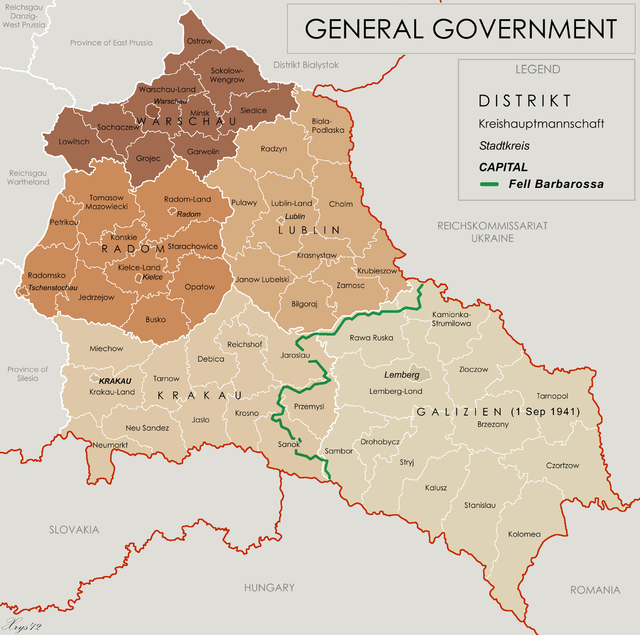|
|
This story is purely anecdotal. It was told to me by the principle participant about his actions during WWII when he was a teenager/young man in Nazi occupied Poland. I believed him when he told it to me; I still believe him. I doubt that he will write a biography, so I will relate the events here so that they may be preserved . . .
I met the old soldier while I was working for the U.S. Army in Panama. I think the year was 1986, just before Christmas. Another friend had brought him over for dinner, and I was enthralled with his personal accounts from WWII. He was an accomplished linguist and knew several languages – English, German, Russian, French, Spanish, probably Korean as well. He credited his mastery of more than one German dialect with his ability to survive WWII. He said that he had been commissioned as a lieutenant in the Polish resistance forces when he was 16.
He had seen the war coming; as preparation, he had studied and mastered at least two German dialects. Early in the war, he was captured and sent to a German labor camp. He was born into the Polish aristocracy, and, perhaps because of his fluent German, the camp commander sent for him one day. I am not certain if the commander had some small chore for him to do; but the commander said that he had heard that the Polish aristocracy had a reputation for keeping their word, and the commander wished to test that reputation.
He proposed this test: I will give you a pass to go back to your home and visit your family; you will give me your word that you will return as required on the pass. Maybe he had to deliver a message. My memory fails on that point.
The old soldier had gladly accepted the challenge as a teenager. It was early in the war. He took the pass (as I recall for a few days), and upon arriving at his home contacted the best forger that he could find, who made him a duplicate pass for a future date. When he returned to the camp he hid the duplicate pass. A couple of weeks later, he escaped on the duplicate and returned to his home.
He said that there was a factory in the town that made the “Army .45”. I presumed that the meant the Polish Radom pistol, which is a Browning derived pistol made in Poland before and during WWII. They are well thought of, but most were made in 9mm, with only a few in .45 and .22. Our young resistance fighter said that now that he was on the run, he needed a pistol, and he needed documents.
He entered the factory and went along the line, picking up a part at every station. After he left the factory, he assembled the pistol. This part of his story is partly verified in this article about the Radom VIS. As the story was told to me in 1986, when the Internet was just a collection of email addresses, (I had a connection for my work at the Tropical Test Center) I consider this Internet source to offer some validation. Quite a number of these pistols were used in the uprising of the Jewish Warsaw Ghetto.
He went to the local collaborator who worked with the Germans. He showed him the pistol and told him that he needed identification documents. Only a German officer could authorize the documents, so he told the collaborator to tell the officer that he was a cousin from the country who needed to be documented so that he could find work. He told the collaborator that if anything went wrong, the pistol would be used on the collaborator first.
They went to the German officer and the collaborator tried to tell the story, but his German was not nearly as good as that of the young resistance fighter. He told the officer the story, in the native dialect of the officer. The officer signed the request for the identification, then told the collaborator: “You ought to consider your cousin as an example. He really knows how to speak German!”
He managed to survive the war and joined the U.S. Army afterward. When I met him, he had been retired for a number of years. In his early 60’s, he was lean and sharp.
©2014 by Dean Weingarten: Permission to share is granted when this notice is included.
Gun Watch






Good story. I collect WW2 firearms, and I find these tales fascinating.
If you want to read more about what the Poles went through during WW2 check out Fighting Poles by Paul Mazan on Amazon. It is a amazing story of how people can persevere over the atrocity’s they are forced to endure. It also contains my Grandfathers WW2 stories as an American of Polish decent fighting the Germans. The fact that he could speek Polish was of great help to his outfit as the Polish slaves in Germany were more than happy to tell him where the Germans were and what they were up to.
he may have been either a German or a Pole, served in the Werhmacht or SS and informally become a regular Pole in 1945, many did for obvious reasons. Hope not, its a great story.
The ViS is a fairly sought-after collector item. Both with original Radom stamp and with the Swastika. In either case, it is a Browning High Power ‘clone’.
Good thing he was a nazi prisoner didn’t the Soviets killed all the Polish officers they got.
Yes. Google “Katyn”
There’s also the lesser-known battle of Warsaw in 1944. While members of the Polish home-army fought the Germans against hopeless odds, Soviet troops literally sunbathed across the Vistula and watched through their binoculars. They waited for the Poles to be defeated so they could drive out the remaining Germans and take credit as the sole liberators of Warsaw.
It was actually Stalins plan to have future opposition eliminated by letting the Germans do his dirty work for him, the Warsaw fighters would have opposed Stalin!
I suggest anyone that is interested in this topic read a book called ‘If Not Now, When?’ by a man named Primo Levi
A)Our young resistance fighter said that now that he was on the run, he needed a pistol, and he needed documents.
B) …………
C). He entered the factory and went along the line, picking up a part at every station.
It seems like you left out something.
Old Cold War joke:
An East German working in a factory that produced parts for baby carriages decided to smuggle home enough parts to assemble a carriage for his infant children.
One day a coworker asked, “How’s that baby carriage coming along?”
The East German replied, “It’s very strange. I’m sure I’ve got all the parts, but no matter how I start assembling, it comes out a machine gun!”
He did not say it, but I suspect that he was already in contact with or in the resistance. The Internet article says that the Germans had a serious problem in pistol parts going to the resistance to be assembled into pistols.
My guess is that the forger he mentioned was in the resistance as well, but he never said that.
I’m ethnically Southern Irish but with born in England with British citizenship. My father fought in the Second World War. When I was a kid I asked him why he wasn’t more mad at the Germans. This was after we immigrated to the US and I became an American citizen.
He made it real clear. War should be fought by the children of those who decide to declare it. There was a clear distinction to be made between the Germans and the Nazis.
He pointed out that it just have been Great Britain that went Nazification and that every country was possible of becoming like them.
He was right.
“There was a clear distinction to be made between the Germans and the Nazis.”
There were very few “good Germans”.
You should find and read “Hitler’s Willing Executioners”
Another enlightening read is “they thought they were free: the germans 1933-45”.
http://www.amazon.com/They-Thought-Were-Free-Germans/dp/0226511928
“Writing as a liberal American journalist of German descent and Jewish religious persuasion Mr. Mayer aims—and in the opinion of this reviewer largely succeeds—at scrupulous fairness and unsparing honesty. It is this that gives his book its muscular punch.”—Walter L. Dorn, Saturday Review
“Hitler’s Willing Executioners” is decisively regarded as abysmal scholarly work world-wide and was even criticized as “racist germanophobia” by Jewish-American studies professor Fritz Stern of Columbia University. The author’s professorship at Harvard is largely attributed to his father’s legacy there anyway. Try citing a real scholarly source next time you want to make sweeping generalizations about everyone who lived in a particular country during a twelve year period.
Check out a movie called “Kanal” (sewer) which is set during the Warsaw Uprising. I saw it many years ago and don’t remember how the film is slanted politically, but I do recall that the military hardware was very interesting. There was a scene where German engineers tried to use a Goliath remote control demolition tank. A Polish soldier ran up to it and cut the wires with an entrenching shovel. Good stuff and probably the only time that particular weapon was used in a movie.
Buddy has a Radom, thing shoots like a dream, tried to acquire it, just about came to blows when I asked him if he would sell it to me, LOL!
The Poles were very sharp. Prior to WW2 they stole an Enigma cypher machine from the Germans and performed much of the mathematical analysis needed to decypher Enigma messages. Once the war began, they passed their stolen example to the British who finished the job.
Yes, without the Polish obtained enigma machine, we might well have lost the war.
Poles bought the commercial (much simpler) version of the Enigma and three brilliant mathematicians figured out how the military version worked. Then they build “Polish” Enigma to decipher the messages.
On the side of the handguns: VIS is more derivative of Colt 1911 than FN HP (although FN HP “borrowed” some ideas from VIS and the other way round). I would love to have the prewar gun in good shape, unfortunately they are a bit too expensive.
Yes, it was vital, and in steady use throughout the Africa campaign and much later. I recently saw a TV item on a Spanish spy who volunteered for the Abwehr (after being turned down by the British), and who invented an entire imaginary spy ring based on his reading of the British Isles at the Lisbon Library. Later he was accepted into MI5, and created a large amount of written and radio traffic from Britain to the Germans. It was he who convinced Hitler to countermand Rommel, and hold all the Panzer divisions and 300,000 men at Calais for a month after the D Day landings at Normandie, ensuring the Allies’ success. Without this the invasion would have been defeated, and the war prolonged for possibly many years.
Great story.
These need to be written before they are lost.
Check out a Polish American the Germans called der Geist (the Ghost) because he kept coming back.
7 Purple Hearts, MOH Capt Matt Urban
http://en.wikipedia.org/wiki/Matt_Urban
Recently I found out that Nazi propaganda was very instrumental in the popularization, if not the creator, of the “Polish Joke”. I guess it makes total sense, I just had never questioned it until a few years ago. Insidious stuff.
One gunsmith from Poland started to make VIS in .45 ACP. Look at that!
http://www.tobys-rusznikarstwo.pl/
Comments are closed.